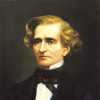Hector Berlioz

Hector Berlioz
Hector Berlioz; 11 December 1803 – 8 March 1869) was a French Romantic composer, best known for his compositions Symphonie fantastique and Grande messe des morts. Berlioz made significant contributions to the modern orchestra with his Treatise on Instrumentation. He specified huge orchestral forces for some of his works, and conducted several concerts with more than 1,000 musicians. He also composed around 50 songs. His influence was critical for the further development of Romanticism, especially in composers like Richard Wagner, Nikolai...
NationalityFrench
ProfessionComposer
Date of Birth11 December 1803
CountryFrance
The luck of having talent is not enough; one must also have a talent for luck.
The trombone is the true head of the family of wind instruments... it has all the serious and powerful tones of sublime musical poetry, from religious, calm and imposing accents to savage, orgiastic outburst.
Heine commenting on the music of Louis Hector Berlioz: He is an immense nightingale, a lark as great as an eagle. . . . The music causes me to dream of fabulous empires, filled with fabulous sins.
It is not enough that the artist should be well prepared for the public. The public must be well prepared for what it is going to hear.
A feeble mind, conscious of its own feebleness, grows feeble under that very consciousness. As soon as the power of fear becomes known to it, there follows the fear of fear, and, on the first perturbation, reason abandons it.
Every composer knows the anguish and despair occasioned by forgetting ideas which one had no time to write down.
Time, time - that is our greatest master! Alas, like Ugolino, time devours its own children.
It is difficult to put into words what I suffered-the longing that seemed to be tearing my heart out by the roots, the dreadful sense of being alone in an empty universe, the agonies that thrilled through me as if the blood were running ice-cold through my veins, the disgust with living, the impossibility of dying. Shakespeare himself never described this torture; but he counts it, in Hamlet, among the terrible of all the evils of existence. I had stopped composing; my mind seemed to become feebler as my feelings grew more intense. I did nothing. One power was left to me-to suffer.
At least I have the modesty to admit that lack of modesty is one of my failings.
To render my works properly requires a combination of extreme precision and irresistible verve, a regulated vehemence, a dreamy tenderness, and an almost morbid melancholy.
Music and love are the wings of the soul.
It is so rare...to find a complete person, with a soul, a heart and an imagination; so rare for characters as ardent and restless as ours to meet and to be matched together, that I hardly know how to tell you what happiness it gives me to know you.
Love cannot express the idea of music, while music may give an idea of love
Time is a great teacher, but unfortunately it kills all its pupils. (Le temps est un grand maître, dit-on; le malheur est qu'il soit un maître inhumain qui tue ses élèves.)